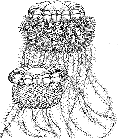WoRMS taxon details
Rhodaliidae Haeckel, 1888
135350 (urn:lsid:marinespecies.org:taxname:135350)
accepted
Family
Angelidae Fewkes, 1886 · unaccepted (synonym)
Rhodalidae Haeckel, 1888 · unaccepted (incorrect formation of family name)
- Genus Angelopsis Fewkes, 1886
- Genus Arancialia Hissmann, 2005
- Genus Archangelopsis Lens & van Riemsdijk, 1908
- Genus Dendrogramma Just, Kristensen & Olesen, 2014
- Genus Dromalia Bigelow, 1911
- Genus Rhodalia Haeckel, 1888
- Genus Steleophysema Moser, 1924
- Genus Stephalia Haeckel, 1888
- Genus Thermopalia Pugh, 1983
- Genus Tridensa Hissmann, 2005
- Genus Sagamalia Kawamura, 1954 accepted as Steleophysema Moser, 1924
- Genus Stephonalia Haeckel, 1888 accepted as Stephalia Haeckel, 1888
marine, fresh, terrestrial
Not documented
Schuchert, P. (2024). World Hydrozoa Database. Rhodaliidae Haeckel, 1888. Accessed through: World Register of Marine Species at: https://www.marinespecies.org/aphia.php?p=taxdetails&id=135350 on 2024-07-26
Date
action
by
![]() The webpage text is licensed under a Creative Commons Attribution 4.0 License
The webpage text is licensed under a Creative Commons Attribution 4.0 License
original description
(of Angelidae Fewkes, 1886) Fewkes, J. W. 1886a. Report on the medusae collected by the U. S. F. C. Steamer Albatross, in the region of the Gulf Stream, in 1883-84. - United States Commission of Fish and Fisheries 12: 927-980, pls 1-10., available online at https://www.biodiversitylibrary.org/page/15835306
page(s): 971 [details]
original description (of Rhodalidae Haeckel, 1888) Haeckel, E. (1888). System der Siphonophoren auf phylogenetischer Grundlage entworfen. <em>Jenaische Zeitschrift für Naturwissenschaft.</em> 22: 1-46., available online at https://www.biodiversitylibrary.org/page/12007523
page(s): 43 [details]
context source (Hexacorallia) Fautin, Daphne G. (2013). Hexacorallians of the World. (look up in IMIS) [details]
basis of record Haeckel, E. (1888). Report on the Siphonophorae. <em>Report on the Scientific Results of the Voyage of H.M.S. Challenger during the years 1873–76. Zoology.</em> 28 (part 77): i-viii, 1-380, pl. 1-50., available online at https://www.biodiversitylibrary.org/page/3155485 [details]
additional source Pugh, P. R. (1983). Benthic Siphonophores: A Review of the Family Rhodaliidae (Siphonophora, Physonectae). <em>Philosophical Transactions of the Royal Society B: Biological Sciences.</em> 301(1105): 165-300. (look up in IMIS), available online at https://doi.org/10.1098/rstb.1983.0025 [details]
page(s): 971 [details]
original description (of Rhodalidae Haeckel, 1888) Haeckel, E. (1888). System der Siphonophoren auf phylogenetischer Grundlage entworfen. <em>Jenaische Zeitschrift für Naturwissenschaft.</em> 22: 1-46., available online at https://www.biodiversitylibrary.org/page/12007523
page(s): 43 [details]
context source (Hexacorallia) Fautin, Daphne G. (2013). Hexacorallians of the World. (look up in IMIS) [details]
basis of record Haeckel, E. (1888). Report on the Siphonophorae. <em>Report on the Scientific Results of the Voyage of H.M.S. Challenger during the years 1873–76. Zoology.</em> 28 (part 77): i-viii, 1-380, pl. 1-50., available online at https://www.biodiversitylibrary.org/page/3155485 [details]
additional source Pugh, P. R. (1983). Benthic Siphonophores: A Review of the Family Rhodaliidae (Siphonophora, Physonectae). <em>Philosophical Transactions of the Royal Society B: Biological Sciences.</em> 301(1105): 165-300. (look up in IMIS), available online at https://doi.org/10.1098/rstb.1983.0025 [details]
 Present
Present  Inaccurate
Inaccurate  Introduced: alien
Introduced: alien  Containing type locality
Containing type locality
From editor or global species database
Diagnosis Physonectae with nectosome and siphosome contracted to form a globular complex below the enlarged pneumatophore. The gas-secreting area is developed greatly to form a characteristic structure, the aurophore, extending from the baso-dorsal surface of the pneumatophore. The animals are benthic, attaching themselves to the sea-bed by their tentacles. [details]
| Language | Name | |
|---|---|---|
| Japanese | ヒノマルクラゲ科 | [details] |

